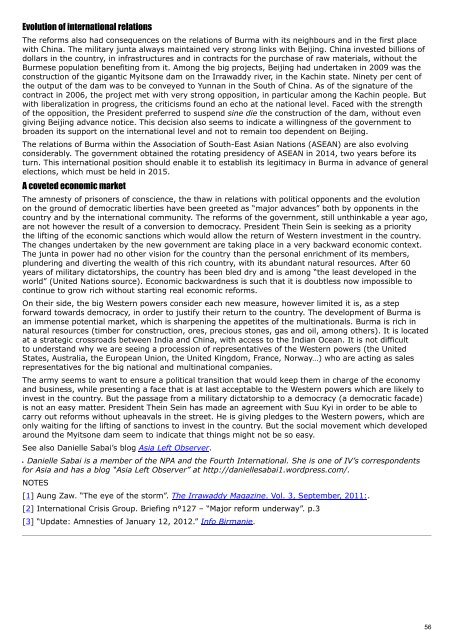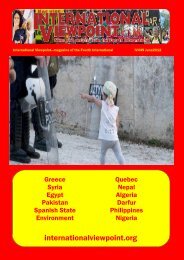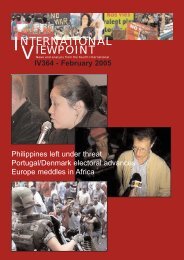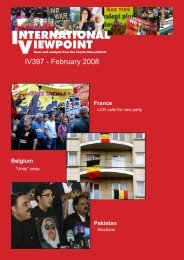download - International Viewpoint
download - International Viewpoint
download - International Viewpoint
Create successful ePaper yourself
Turn your PDF publications into a flip-book with our unique Google optimized e-Paper software.
Evolution of international relations<br />
The reforms also had consequences on the relations of Burma with its neighbours and in the first place<br />
with China. The military junta always maintained very strong links with Beijing. China invested billions of<br />
dollars in the country, in infrastructures and in contracts for the purchase of raw materials, without the<br />
Burmese population benefiting from it. Among the big projects, Beijing had undertaken in 2009 was the<br />
construction of the gigantic Myitsone dam on the Irrawaddy river, in the Kachin state. Ninety per cent of<br />
the output of the dam was to be conveyed to Yunnan in the South of China. As of the signature of the<br />
contract in 2006, the project met with very strong opposition, in particular among the Kachin people. But<br />
with liberalization in progress, the criticisms found an echo at the national level. Faced with the strength<br />
of the opposition, the President preferred to suspend sine die the construction of the dam, without even<br />
giving Beijing advance notice. This decision also seems to indicate a willingness of the government to<br />
broaden its support on the international level and not to remain too dependent on Beijing.<br />
The relations of Burma within the Association of South-East Asian Nations (ASEAN) are also evolving<br />
considerably. The government obtained the rotating presidency of ASEAN in 2014, two years before its<br />
turn. This international position should enable it to establish its legitimacy in Burma in advance of general<br />
elections, which must be held in 2015.<br />
A coveted economic market<br />
The amnesty of prisoners of conscience, the thaw in relations with political opponents and the evolution<br />
on the ground of democratic liberties have been greeted as “major advances” both by opponents in the<br />
country and by the international community. The reforms of the government, still unthinkable a year ago,<br />
are not however the result of a conversion to democracy. President Thein Sein is seeking as a priority<br />
the lifting of the economic sanctions which would allow the return of Western investment in the country.<br />
The changes undertaken by the new government are taking place in a very backward economic context.<br />
The junta in power had no other vision for the country than the personal enrichment of its members,<br />
plundering and diverting the wealth of this rich country, with its abundant natural resources. After 60<br />
years of military dictatorships, the country has been bled dry and is among “the least developed in the<br />
world” (United Nations source). Economic backwardness is such that it is doubtless now impossible to<br />
continue to grow rich without starting real economic reforms.<br />
On their side, the big Western powers consider each new measure, however limited it is, as a step<br />
forward towards democracy, in order to justify their return to the country. The development of Burma is<br />
an immense potential market, which is sharpening the appetites of the multinationals. Burma is rich in<br />
natural resources (timber for construction, ores, precious stones, gas and oil, among others). It is located<br />
at a strategic crossroads between India and China, with access to the Indian Ocean. It is not difficult<br />
to understand why we are seeing a procession of representatives of the Western powers (the United<br />
States, Australia, the European Union, the United Kingdom, France, Norway…) who are acting as sales<br />
representatives for the big national and multinational companies.<br />
The army seems to want to ensure a political transition that would keep them in charge of the economy<br />
and business, while presenting a face that is at last acceptable to the Western powers which are likely to<br />
invest in the country. But the passage from a military dictatorship to a democracy (a democratic facade)<br />
is not an easy matter. President Thein Sein has made an agreement with Suu Kyi in order to be able to<br />
carry out reforms without upheavals in the street. He is giving pledges to the Western powers, which are<br />
only waiting for the lifting of sanctions to invest in the country. But the social movement which developed<br />
around the Myitsone dam seem to indicate that things might not be so easy.<br />
See also Danielle Sabai’s blog Asia Left Observer.<br />
Danielle Sabai is a member of the NPA and the Fourth <strong>International</strong>. She is one of IV’s correspondents<br />
for Asia and has a blog “Asia Left Observer” at http://daniellesabai1.wordpress.com/.<br />
NOTES<br />
[1] Aung Zaw. “The eye of the storm”. The Irrawaddy Magazine. Vol. 3, September, 2011:.<br />
[2] <strong>International</strong> Crisis Group. Briefing n°127 – “Major reform underway”. p.3<br />
[3] “Update: Amnesties of January 12, 2012.” Info Birmanie.<br />
56









